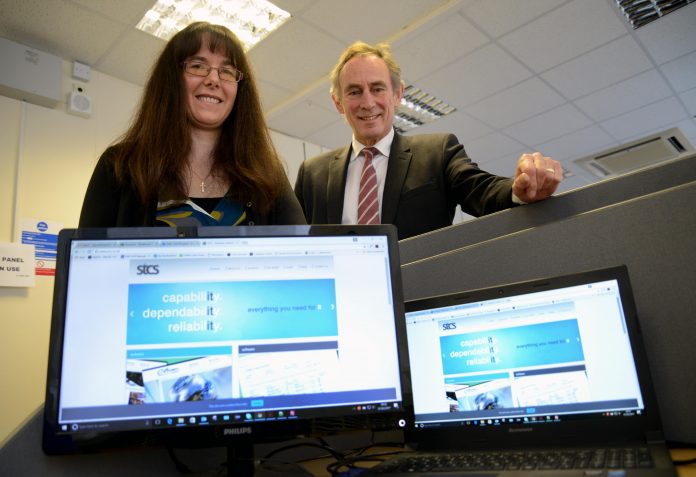Some graduates find themselves unsuited to the fast-changing world of employment despite impeccable qualifications. Degree apprenticeships can be a good way to provide the skills needed in the workforce. Classics graduate Jennifer Gane found that by landing a degree apprenticeship in digital technology solutions she was able to link a dead language to one that’s very much alive – and find a job.
When I graduated with a PhD in classics in 2012 I had no firm idea about what the future would hold.
I had started my doctorate determined to become a lecturer, but six years later, with a husband and young child, a mortgage, and a realisation that academic jobs were quite hard to come by, I hadn’t really got a career plan for the rest of my life. A couple of years and another child later, I decided that I needed to make some decisions about my career, and wondered if I might be any good as a computer programmer.
There was some rationale behind this random thought. When I was a classics undergraduate in the 1990s it was an oft-repeated mantra that studying Latin enabled you to work in almost any field, and I was told: ‘half of Silicon Valley are classicists’. Whether that was ever true I have no idea, but buoyed with enthusiasm by the sentiment I began to learn to code.
A classicist who wanted to code – would people laugh?
Codecademy provided an – importantly – free introduction to the world of HTML and CSS, and within two sessions I was hooked. My brain just delighted in learning new syntax and trying to use verbal instructions to create something on a screen. I decided that this was the career for me, but how was I going to achieve it?
My husband would have been singularly unimpressed if I’d announced one day that I’d decided to go back to university – again! – to study programming, and I knew that I didn’t have the time to immerse myself in code to reach a level that would make me employable.
I am studying a subject that fascinates me and getting paid for it… and I know that I have a guaranteed job when I finish my degree.
The solution presented itself in the form of a university careers fair. I’d been coding for two months and went along to see if I could have any useful conversations with potential employers. Half of Silicon Valley might have been classicists in the mid ‘90s, but nowadays people are expected to study computer science or related degrees if they want a job. I was hoping to find someone who wouldn’t laugh at me when I told them I was a classicist who wanted to code!
Fortunately for my self-esteem no one actually laughed, although some of the responses weren’t completely positive. But then I had a conversation with Rachael at software developers STCS whose reply to my “I’m a classicist” was “Well, I used to be a buyer for a fine art company”, and I knew I was in with a chance! She encouraged me to apply for the graduate positions they had, saying that they were more interested in how well people did in the company’s aptitude test than necessarily their experience in programming.
I applied, completed the aptitude test and was given an interview. Afterwards I knew that it had gone well in general, but was also very aware that I didn’t have enough knowledge to do the job. When I got the post-interview ‘phone call, I was expecting defeat, but the conversation took an unexpected turn. John Wiseman, the director [pictured with Jennifer], said that STCS were involved in the degree apprenticeship scheme at Northumbria University and they wanted to offer me a job as a degree apprentice which would start in September. I was delighted!
I began working at STCS at the beginning of September 2015 and started the digital technology solutions degree three weeks later. On my first day at work I was given a laptop and a thick book on a scripting language called PHP to work through, and that was my routine for four days a week for the next couple of months, interspersed with some training on database design. I was in my element!
After that I started to work on some website functionality using the PHP skills that I’d learned. The learning curve was quite steep, and caused me a serious brain workout at times, but the sense of achievement when I managed to get the code working was fantastic.
Degree apprenticeships allowed me to change direction
I go to university on a Monday, and have studied a whole range of modules such as business organisation, Java programming and web technologies. The subjects have given me a broad understanding in a shorter time than I would have got just being at work, and my coding ability has progressed at a much faster rate through practising at work than it would have by just going to university.
It has been two years since I wrote my first HTML tag, and I can’t believe my career has taken such an unexpected turn. I love going to work and I love going to university, and I am so grateful that the degree apprenticeship scheme has enabled me to change direction so easily and successfully.
I am studying a subject that fascinates me and getting paid for it, while also building up significant useful experience in my field, and I know that I have a guaranteed job when I finish my degree. I have been given opportunities to develop in ways that I wouldn’t have imagined, and I am so glad that waking up one morning and wondering if I could become a computer programmer wasn’t such a bad thought after all.








